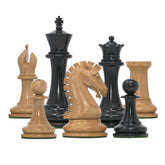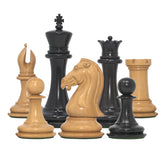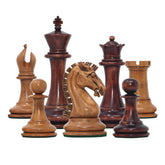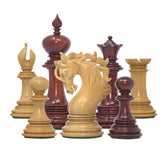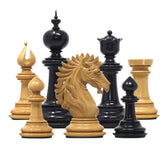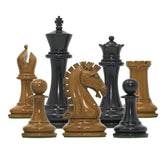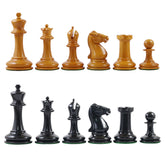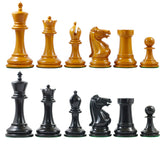A PERFECT GUIDE TO AVOID BLUNDER MISTAKES IN CHESS
Chess is a game that needs a lot of thinking and planning. If you make a mistake, it can not be very good. Making mistakes in chess are called blunders. They can make you lose pieces or even the whole game. This content will help you to learn about blunders, why they are bad, and how to stop making them. Let’s hop into this article and learn quickly how to avoid mistakes in chess.
HOW TO UNDERSTAND BLUNDERS IN CHESS
As we all know, a blunder in chess is a serious mistake or may result in a significant loss of advantage, material, or the game itself. A blunder in chess is a detracting error leading to a big loss in advantage, material, or even the game. It's a move or sequence departing from sound chess principles, resulting in unfavorable outcomes. These mistakes can happen at any point in the game, impacting players regardless of their skill level.

FEW TYPES OF BLUNDERS
Blunders can be revealed in different forms in the world of chess. It ranges from tactical lapse to strategic misjudgments. Understanding these specific types of blunders is critical for honing your chess skills and minimizing mistakes on the board. The two main categories of blunders in chess are:
STRATEGIC BLUNDERS
These mistakes occur when players do not notice or underestimate any kind of danger like vulnerable pieces, clever tactics, or easy ways to win. Ignoring these tactical changes can result in missed advantages or even losing the game.
CRITICAL BLUNDERS
These involve improper decision-making related to pawn structure, piece placement, king safety, or positional plans. Ignoring strategic principles can result in an adverse position, compromising control and classification.
SOME COMMON BLUNDERS IN CHESS
Blunders in chess can happen at any level of play, and it's really important to be aware of the common blunders that can lead to no good consequences on the chessboard, nor have much experience. By identifying these fallbacks and actively working to avoid them, you can enhance your game and increase your chances of success.
HERE ARE SOME PREVAILING BLUNDERS
Hanging Pieces: Allowing the opponent to capture it without consequences, by leaving a valuable piece undefended is a frequent blunder. Always be careful of the safety of your chess pieces.
Tactical Oversights: If you don't notice chances to make smart moves in chess, like setting up attacks or tricky combinations, you might miss out on winning or end up in a bad position. But if you practice solving puzzles and learn about these tricky moves, you'll get better at spotting them during a game.
Negligence of king’s safety: Ignoring the safety of your king can result in falling victim to checkmate. It should be a priority in the game to protect the king first.
Poor Piece Development: If you don't move your chess pieces enough, your side of the board can get crowded, making it hard to work together or protect yourself from your opponent's moves. Make sure all your pieces are evenly spread out and working well together.
Premature Queen Moves: If you move your queen too fast in the game, it might get into trouble with the progress of your other pieces. It's better to start by moving your smaller pieces and keep the queen safe until later.
Pawn Structure Weaknesses: Moving pawns with careless moves can weaken the pawn structure, providing targets for the opponent to exploit. Be very careful with pawn moves and consider their impact on your position.

HOW DO YOU STOP BLUNDERING IN CHESS?
Mistakes in chess can be annoying and make you lose, but they don't have to happen all the time. If you use smart plans and stay focused during the game, you can stop yourself from making those costly mistakes. Here are some easy tips to help you avoid them:
Calculate and Analyze: Take your time to think about different moves, predict what your opponent might do, and look closely at the situation on the board. This helps you avoid making mistakes and plan your moves better. By thinking carefully about each move and what might happen next, you can play smarter and make better decisions in chess.
Concentration and Focus: Always stay concentrated and don't let anything distract you while playing. If you pay attention to every move, you'll be able to notice any mistakes and make the right choices.
Study Tactics: Keep practicing solving puzzles, studying different tactics, and recognizing patterns regularly. Doing this will help you get better at spotting tactical chances and taking advantage of them.
Time Management: Give ample time for tough moves, especially in complex positions or time-controlled games. Avoiding speedy decisions due to time pressure will help you maintain clarity and reduce the chances of blunders in chess.
Review Past Games: Look back at your past games and figure out where you made mistakes often. Thinking about how you played helps you understand what went wrong and how to do better next time. This helps you keep getting better at chess.
SUMMING UP

In the realm of chess, blunders are similar to stumbling blocks on the path to victory. They can swiftly turn the tide of a game, transforming a position of strength into one of vulnerability. Understanding the importance of blunders is paramount for any aspiring chess player. These missteps come in assorted forms, ranging from simple oversights to more complicated and multiple errors in judgment. A fundamental aspect of combating blunders is vigilant of their common manifestations. Simple tactical oversights, such as leaving a piece unprotected or failing to anticipate an opponent's threat, are common occurrences even among seasoned players.
Strategic blunders, on the other hand, involve positional misjudgments or misguided plans that can lead to long-term damage or loss. By familiarizing oneself with these typical blunders, players can develop a deep sense of awareness during games, enabling them to anticipate and diminish potential traps.
Moreover, learning from blunders is an important component of improvement in chess. Each mistake presents an opportunity for growth, offering valuable insights into one's thought processes and areas for development. Analyzing past games, particularly those marred by blunders, allows players to identify recurring patterns and devise strategies to address them. Embracing the challenge of improving mistakes fosters resilience and adaptability, key traits for success in the competitive arena of chess.
Striving for rigor and accuracy is the ultimate thing to blunders in chess. This requires meticulous calculation, thorough evaluation of candidate moves, and disciplined constancy to strategic principles. By formulating accuracy over haste, players can minimize the likelihood of committing critical errors and maintain control over the course of the game.
In essence, blunders in chess serve as invaluable learning experiences. It can illuminate the path to mastery through trial and error. By understanding their importance, realizing common skills and phenomenon, and embracing the challenge of improvement, players can elevate their game to new heights of proficiency and accurate precision.
Buy Wooden Chess Sets and Pieces : www.stauntoncastle.com
Sample Block Quote
Sample Paragraph Text
- basic rule of chess
- basic rules of chess game
- beginner to pro in chess game
- benefit of playing chess
- benefits of chess game
- Best 10 Chess Opening Books
- best benefit of chess game
- best board game for kids
- best chess clock
- best chess clock features
- best chess female player in the world
- chess books
- Chess buy guide
- chess class
- chess facts
- chess female player
- CHESS GAMBITS
- chess game
- chess game facts
- chess games
- Chess Genius
- chess Grandmaster
- chess helps to grow human brains
- chess Mistake
